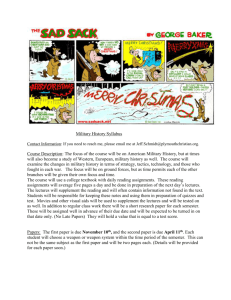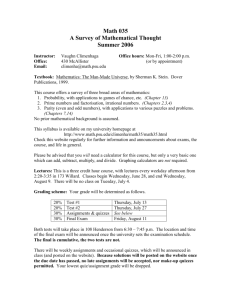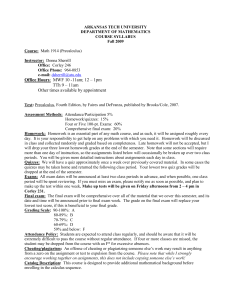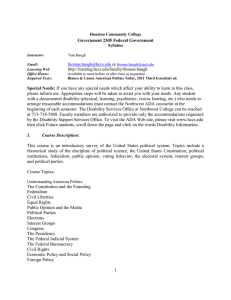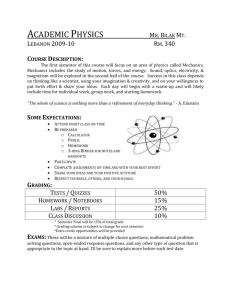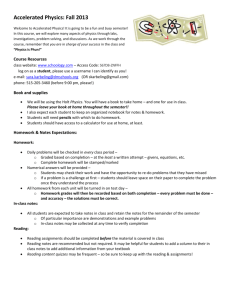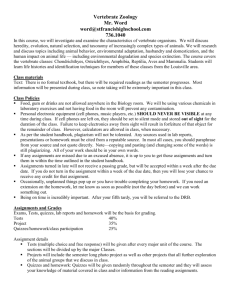Syllabus GOVT 2305 (Spring 2014) - Learning Web
advertisement
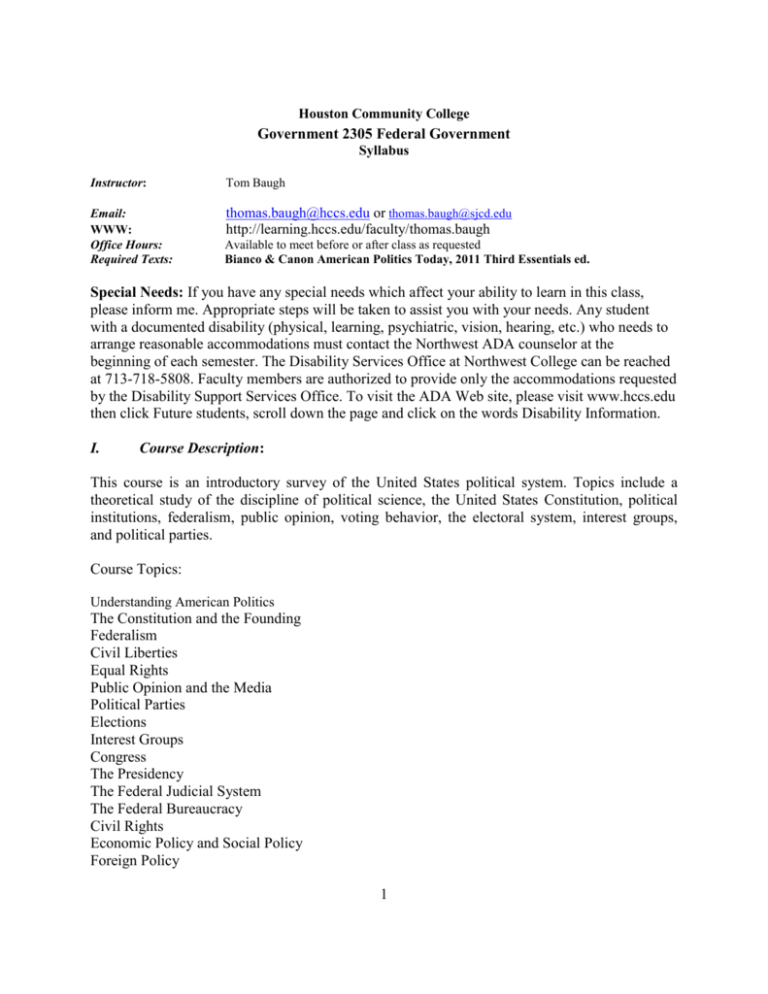
Houston Community College Government 2305 Federal Government Syllabus Instructor: Tom Baugh Email: WWW: Office Hours: Required Texts: thomas.baugh@hccs.edu or thomas.baugh@sjcd.edu http://learning.hccs.edu/faculty/thomas.baugh Available to meet before or after class as requested Bianco & Canon American Politics Today, 2011 Third Essentials ed. Special Needs: If you have any special needs which affect your ability to learn in this class, please inform me. Appropriate steps will be taken to assist you with your needs. Any student with a documented disability (physical, learning, psychiatric, vision, hearing, etc.) who needs to arrange reasonable accommodations must contact the Northwest ADA counselor at the beginning of each semester. The Disability Services Office at Northwest College can be reached at 713-718-5808. Faculty members are authorized to provide only the accommodations requested by the Disability Support Services Office. To visit the ADA Web site, please visit www.hccs.edu then click Future students, scroll down the page and click on the words Disability Information. I. Course Description: This course is an introductory survey of the United States political system. Topics include a theoretical study of the discipline of political science, the United States Constitution, political institutions, federalism, public opinion, voting behavior, the electoral system, interest groups, and political parties. Course Topics: Understanding American Politics The Constitution and the Founding Federalism Civil Liberties Equal Rights Public Opinion and the Media Political Parties Elections Interest Groups Congress The Presidency The Federal Judicial System The Federal Bureaucracy Civil Rights Economic Policy and Social Policy Foreign Policy 1 II. Course Objectives: A. To offer students an introduction to and develop an appreciation of the American political system and public policy making. B. To provide all students with an educational context in which they can appreciate the impact of the political system on their chosen major or career choice. C. To improve the reasoning and communication skills that the students need for their college education and careers. D. Upon completion of Government 2305, you will be able to demonstrate a thorough knowledge of the topics covered in this course as well as satisfy the following Learning Outcomes. 1. 2. 3. 4. 5. 6. 7. 8. III. Explain the origin and development of constitutional democracy in the United States. Demonstrate knowledge of the federal system. Describe separation of powers and checks and balances in both theory and practice. Demonstrate knowledge of the legislative, executive, and judicial branches of the federal government. Evaluate the role of public opinion, interest groups, and political parties. Analyze the election process. Describe the rights and responsibilities of citizens. Analyze issues and policies in United States politics. Student Learning Activities The following Student Learning Activities are designed to maximize your understanding of the course content as well as develop basic competencies and perspectives that are necessary for your overall success in college and in the workforce. Class Lectures: Lectures will be organized and continually updated to include the latest factual material and ideas. Lectures will involve a significant amount of material not contained in the textbooks. The lectures are intended to supplement, not repeat information from the textbook verbatim. Class lectures will develop your ability to analyze, interpret and discuss spoken information. Class Discussion and Group Projects: Class discussion and group projects will be related to the topic under consideration and help students develop critical-thinking and problem solving skills. Discussions and group projects will consist of roleplaying, debates and Socratic classroom discussions and will stress development of your ability to speak, listen, and think critically—individually and as a group. 2 Textbook Readings: An important part of the college experience is learning how to learn independently from the instructor. You will be required to read and learn on your own a significant amount of information and ideas from the textbook. Additional Readings: Because of the lag time in publishing textbooks, extrareading assignments are necessary to provide you with the latest information and ideas—especially in political science. Accordingly, additional readings may be assigned to assist you in gaining new information. Written Assignments: There is one mandatory written assignment which must be turned in no later than Wednesday, April 23. Failure to turn it in by the submission deadline will result in a grade of zero. The written assignment will constitute 10 percent of your grade for the class. Additional information regarding the written assignment will be provided in class. IV. Grading System: Grading in this course is designed to demonstrate your knowledge of the course material in addition to your ability to demonstrate basic competencies and perspectives. If you actively engage in the student learning activities outlined above you should be able to successful complete the course. Tests: There will be four (4) tests. There will be four tests, each covering both the reading material and material discussed only in class. Each will include multiple choice, short answer, and/or essay questions. If you miss a test, contact me immediately to arrange a time for a makeup test (which may be entirely in short answer/essay form). Avoid missing a test if at all possible. Please check the tentative schedule for test dates. You are responsible for all the material on the tentative schedule. Do not ask me to tell you what is on the test or whether something is important. An important part of being a successful student is acquiring a large amount of information, ascertaining the significance of that information and assimilating that information in a way that is useful and productive. Come Prepared: Please bring a Scantron Form 882-E and a No. 2 pencil for each exam. Arrive early for the exam as you will find that you will have time to collect your thoughts and generally your test performance will improve. You will only have the time allotted for your class period to take the exam and if you are more than 20 minutes late you will not be allowed to take the exam. I drop the lowest test score for all students in recognition that everyone has a bad day. This may be a test you miss for whatever reason or simply a test that you do poorly on due to some outside issue (i.e., illness, car problems, etc.) As a word of warning, it is always better to make up a missed exam and use your drop score for a low score rather than a missed exam. 3 Test Review: We will review each test in class after the tests have been graded. This is the only time that you will have to review the answers so do not miss class. You may not make any notes pertaining to the questions during the test review nor can you have your textbook or notes open. You are only permitted to verify the right answer. Quizzes: There will be several random unannounced quizzes. The quizzes are relatively easy (as long as you study the assigned reading); the test questions will be more demanding. Missed quizzes may not be made up. Why not? Because: 1. I will give the answers to that day’s quiz immediately at the end of each quiz. 2. I cannot coordinate separate make-ups for so many quizzes to so many students. 3. Part of the rationale for the quizzes is to reward you for being in class, on time, and prepared to participate in discussion; allowing make-ups would defeat that result. 4. You will have a small number of free quizzes as I will only count your top 5 quizzes as part of your average. Additional Assignments: Throughout the semester you may be given a number of additional assignments that could include writing exercises, computer simulations, and research assignments. These assignments, if any, will be announced in class. Final Examination: A final exam on the material covered during the semester will be taken during the final class period. The final exam will consist of multiple choice questions that will account for at least 50 percent of the total value of the final exam. The final exam may also include essay questions. Essay questions, if any, will account for no more than 50 percent of the value of the final exam. The number of questions on the final and the proportion of the questions that are multiple choice and essay will be announced in class at least one week before the final exam. Again, the questions will be drawn from both the reading material and material discussed in class The final exam is mandatory and will not be dropped. 4 Final Grade: Seventy (70) percent of the final grade is based upon the semester tests and the final exam. This portion of the grade will be determined by adding the three highest semester test grades plus from the comprehensive final exam and dividing by four. Twenty (20) percent is based on quizzes. Ten (10) percent of the final grade is based on the mandatory written assignment. The final grade thus will be calculated as follows: Semester Tests/Final Exam X 0.7 + Quizzes X 0.2 + Written Assignment X 0.1 The final grade will be based on the following scale: 89.50-100.00 79.50-89.49 69.50-79.49 59.50-69.49 00.00-59.49 A B C D F WARNING: I DO NOT CURVE AND I DO NOT ADD POINTS TO YOUR GRADE AT THE END OF THE SEMESTER BECAUSE YOU HAVE THE OPTION OF ADDITIONAL ASSIGNMENT POINTS, I DROP YOUR LOWEST GRADE AND I ROUND. IV. Classroom Policies: Classroom Behavior: This is a college class and you are here to receive a university education. Your success depends on the effort you put into this endeavor. Accordingly, there are certain expectations that I will have of you during the semester—the most important of which is that you conduct yourself in a professional manner. Therefore, you will need to adhere to the following rules: 1. Be on time to class 2. Turn off your cell phone before I walk into class 3. No food or eating in the classroom 4. No talking or passing notes to your classmates during class Honesty Code: As a student at Houston Community College, you are expected to exhibit honesty, integrity and high standards in your academic work. Members of the college community benefit from an open, honest educational environment. We are all responsible to encourage and promote academic integrity, a code of moral and artistic honesty. Students should refer to the Student Handbook for policies and procedures on Cheating and Plagiarism. 5 You will not be allowed to receive assistance from classmates or use notes, books, etc. on any of the exams. Cheating during any part of an exam will result in a zero (0) for that exam. A zero received for cheating on an exam will not be dropped as the lowest exam score and it will be used in computing your final grade. Cheating on an exam will also result in disciplinary proceedings. Do not discuss the exam with students who have not taken the exam. THE POSSESSION OF ELECTRONIC DEVICES DURING EXAMS WILL BE CONSIDERED PROOF OF CHEATING. Plagiarism: Plagiarism includes the appropriation of another's work and the unacknowledged incorporation of that work in one's own written work. Collusion includes the unauthorized collaboration with another person in preparing written work. Tardiness: Do not be late for class. It is very disruptive to your classmates. Do not expect me to repeat instructions or other assignments when you arrive late. It is your responsibility to get all assignments and announcements from your classmates. Exams start at the beginning of class. Students that arrive late for an exam will have only the time of that class period to complete the exam. If you are more than twenty (20) minutes late you will not be allowed to take the exam. Absences: Students are required to regularly attend all lecture periods. You may be dropped from the class if your absences exceed those allowed under the college catalog. It is your responsibility to obtain any missed notes or announcements from your classmates or from the class web site. In other words, do not call me or email me with questions regarding test times or what you missed while you are out (this is particularly true if you make it a habit of missing class). When in doubt refer to the course schedule for material to be covered on each exam. EGLS3 (Evaluation for Greater Learning Student Survey System): At Houston Community College, professors believe that thoughtful student feedback is necessary to improve teaching and learning. During a designated time near the end of the term, you will be asked to answer a short online survey of research-based questions related to instruction. The anonymous results of the survey will be made available to your professors and department chairs for continual improvement of instruction. Go to www.hccs.edu/egls3 for more information. 6

